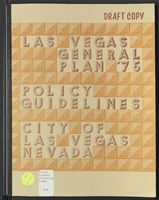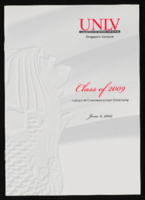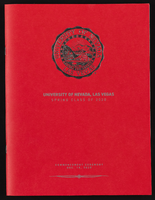Search the Special Collections and Archives Portal
Search Results

Martin Lopez Castillo oral history interview: transcript
Date
Archival Collection
Description
Oral history interview with Martin Lopez-Castillo conducted by Nathalie Martinez, Elsa Lopez, and Barbara Tabach on January 11, 2020 for the Latinx Voices of Southern Nevada Oral History Project. Martin Lopez Castillo was born in a small town in the State of Mexico. He immigrated to Phoenix, Arizona in the early '90s where he worked in construction and landscaping. Eventually, he made his way to Colorado where he began working as a cook. He moved to Las Vegas with his family in the early 2000s where he arrived in Las Vegas' Downtown. He worked in the mine by Primm, Nevada before becoming a gardener. His work has allowed him to see the changes that have happened in Southern Nevada, and he recounts the changes that have happened in Downtown Las Vegas since the 2008 recession. He is a self-taught English speaker and an avid chess collector. Subjects discussed include: Immigration, Chess, Landscaping, Teaching, and Downtown Las Vegas.
Text

Stephen Round oral history interview: transcript
Date
Archival Collection
Description
Oral history interview with Stephen Round conducted by Claytee D. White on October 25, 2017 for the Remembering 1 October Oral History Project. In this interview, Stephen A. Round, a career military contractor, describes his experiences during the 2017 mass shooting in Las Vegas, Nevada. Round mentions moving to Las Vegas in 2013 and in later years staying at the Aria on the evening of October 1. He describes the chaos of the shooting and the 12-hour-plus lockdown at the Aria hotel and casino. The day after the shooting, Round built a memorial around the shooting site and protected it. Once the memorabilia of that first site was taken to the Clark County Museum, he moved to protect the second memorial at the "Welcome to Las Vegas" sign where crosses devoted to the victims had been placed. Along with his preservation of the memorials, Round describes his preparation of a book that was signed by many who visited the sites. Round explains that he was able to see some of the best and worst of humanity during those days of watching and caring for the memorial sites as well as helping any victims, families of the victims, and sympathizers of the Las Vegas 2017 shooting.
Text

Jessica Anderson oral history interview: transcript
Date
Archival Collection
Description
Oral history interview with Jessica Anderson conducted by Claytee D. White on March 7, 2019 for the Remembering 1 October Oral History Project. Anderson begins talking about her early life, family, work history, and the reason why she had moved to Las Vegas, Nevada in 1991. She goes on to talk about the history of Outdoors Nevada where she currently works, and what she was doing the day of October 1, 2017. Anderson recalls how she found out about the shooting, reaching out to friends, and learning more about what happened that night. Anderson talks about the aftermath of the event, how it affected everyone involved, and the healing aspect afterwards. Lastly, she describes the process of creating the Healing Garden, the features of the garden, and the future plans for the area.
Text

Las Vegas General Plan '75: policy guidelines
Date
Description
City of Las Vegas, Nevada general plan, draft copy.
From the introduction: "This is a document of policies. These policies are in the form of recommendations to the City of Las Vegas for planning policies in the areas of: Population and Economic Development, Land Use, Housing, Community Facilities, Conservation, Transportation, Parks and Recreation, Visual Environment, Implementation."
Text

University of Nevada, Las Vegas (UNLV) Singapore Campus Class of 2009 Inaugural Commencement Ceremony program
Date
Archival Collection
Description
Commencement program from University of Nevada, Las Vegas Commencement Programs and Graduation Lists (UA-00115).
Text

Nanyu Tomiyasu interview, March 11, 1978: transcript
Date
Archival Collection
Description
On March 11, 1978, Sosuke Miyazawa interviewed Nanyu Tomiyasu (b. May 28, 1918 in Las Vegas, Nevada) about his family’s farm and their legacy as one of the pioneering families of the city. Tomiyasu begins by talking about what brought his family to Las Vegas, the city’s abundant water reservoir and his father’s farm. In particular, Tomiyasu discusses his father’s experiments with farming as one of the city’s early farmers, the transition into nursery farming and Japanese gardens. Moreover, he discusses his siblings, the local schools, their great quality, the successful students the city produced and the growth of school populations. Tomiyasu describes the large Japanese population and the Union Pacific Railroad that many of them worked on. He ends by discussing the change in architecture within the city, such as where old buildings stood and what they are used for now, the first Episcopal Church and the old Mormon Fort.
Text

University of Nevada, Las Vegas (UNLV) Spring 2020 commencement program
Date
Archival Collection
Description
Commencement program from University of Nevada, Las Vegas Commencement Programs and Graduation Lists (UA-00115).
Text
Helen J. Stewart Photographs
Identifier
Abstract
The Helen J. Stewart Photographs depict the Stewart Family from approximately 1860 to 1950. The photographs primarily depict Helen J. Stewart and her children as well as the Stewart Ranch (also know as the Las Vegas Ranch) in Southern Nevada. The photographs include the early Las Vegas, Nevada town site, landscapes of Southern Nevada and the American Southwest, mines and mining camps, railroads and railroad workers, the Las Vegas Fort (also known as the Old Mormon Fort), hotels and early businesses in Las Vegas, Native Americans and Native American artifacts, and postcards.
Archival Collection
Milton Norman Photograph Collection
Identifier
Abstract
The Milton Norman Photograph Collection (1943-1970) consists of black-and-white photographic prints and negatives taken by City of Las Vegas Code Enforcement officer Milton Norman. The images were recorded as part of a survey of substandard residential dwellings built in the then racially segregated communities of the Westside and Vegas Heights in Las Vegas, Nevada.
Archival Collection

Corey Nyman oral history interview: transcript
Date
Archival Collection
Description
Oral history interview with Corey Nyman conducted by Claytee D. White on May 04, 2018 for the Remembering 1 October Oral History Project. In this interview, Nyman recalls his high school and college experiences, and working in Las Vegas, Nevada as a young adult. On October 1, 2017, Nyman attended the Route 91 Country Music Festival with his brother and a group of friends. They enjoyed the concert from the Red Bull VIP suite, which Nyman felt helped them escape bullets as he and his friends helped others escape. About three hours after escaping the venue, they arrived at Tropicana Avenue and Koval Lane where their ride picked them up. The driver was one of the last allowed into the area under the airport underpass. Nyman discusses his feelings since the shooting, and states that he loves the city and has made it his home despite the traumatic events of the night.
Text
